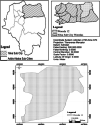Adoption of improved cook stoves by households in informal settlements of Woreda 12, Yeka subcity, Addis Ababa
- PMID: 36405780
- PMCID: PMC9640823
- DOI: 10.1186/s13705-022-00370-4
Adoption of improved cook stoves by households in informal settlements of Woreda 12, Yeka subcity, Addis Ababa
Abstract
Background: This study analyzed the factors affecting the use of improved cook stoves (ICS) in informal settlements of Addis Ababa based on the data generated from 450 households drawn from Woreda (Woreda is a local term used to describe the lowest administrative unit of Addis Ababa City Administration, Ethiopia.) 12 of Yeka subcity. It examined the interactive effect of households' socio-economic backgrounds and energy sources on the adoption of ICS. The data were analyzed using descriptive methods and the multinomial logit model.
Results: Demographic and economic factors such as sex of the household head,[Household head is the one who has an income and decision-making power in family affairs (a husband for married people)], family size and family income have no relationships with households' ICS use while education level, number of years lived in the area, type of home owned, and stove-operating costs have a significant influence on the choice of an ICS. Households that live in a good home (made from wood and cement) used more Mirt (Mirt is an improved firewood stove mainly used to bake Injera and bread.) and Lakech [Lakech also called Tikikil is an improved charcoal stove used to cook different kinds of dishes (non-Injera)] stoves than the traditional three-stone stoves. On the other hand, household heads with higher levels of education and who have lived more than 7 years in the area in a better home owned more ICS than the traditional three-stone stoves.
Conclusions: The availability, affordability, durability and simplicity to operate stoves, and subsidies affect the choice of an ICS. Energy sources that are commonly used by households in informal settlements also have a strong influence on the choice of energy-efficient stoves. Compared to ICS, heavy use of traditional three-stone stoves by households that already have access to electricity, directs government policies to focus on providing reliable electric service and subsidize those using ICS.
Keywords: Addis Ababa; ICS; Informal settlement; Lakech stove; Mirt stove; Three-stone stove.
© The Author(s) 2022.
Conflict of interest statement
Competing interestsThe authors declare that there are no financial interests or personal relationships that could have influenced the findings of this research.
Figures





References
-
- Bhattacharjee S, Reichard G (2011) Socio-economic factors affecting individual household energy consumption: a systematic review, Proceedings of the ASME 2011 5th International Conference on Energy Sustainability. Washington, DC: https://www.researchgate.net/publication/267646836
-
- Chagunda MF, Kamunda C, Mlatho J, Mikeka C, Palamuleni L (2017) Performance assessment of an improved cook stove (Esperanza) in a typical domestic setting: implications for energy saving. 7(19)
-
- Sohagab K, Beguma RA, Abdullaha SM, Jaafar M. Dynamics of energy use, technological innovation, economic growth and trade openness in Malaysia. Energy. 2015;90(2):1497–1507. doi: 10.1016/j.energy.2015.06.101. - DOI
-
- Parka C, Xingb R, Hanaokab T, Kanamorib Y, Masuib T. Impact of energy efficient technologies on residential CO2 emissions: a comparison of Korea and China. Energy Procedia. 2017;111:689–698. doi: 10.1016/j.egypro.2017.03.231. - DOI
LinkOut - more resources
Full Text Sources
